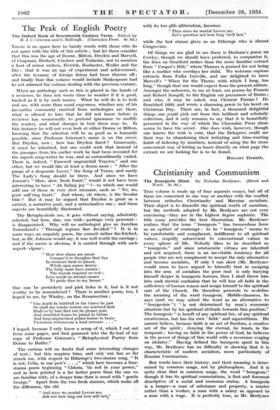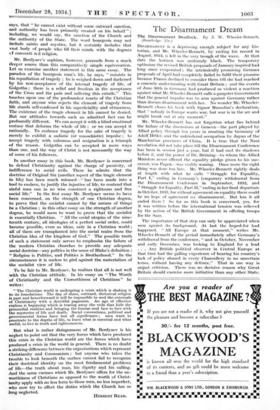Christianity and Communism The Bourgeois Mind. By Nicholas Berdyaev. (Sheed
and Ward. 3s. 6d.) Tuts volume is made up of four separate essays, but all of them are concerned in one way or another with the conflict between orthodox Christianity and Mandan socialism Their object is to discredit the spiritual worth of socialism, but the methods adopted by Mr. Berdyaev are not very convincing—they are in the highest degree sophistic. The title essay provides the best illustration. Mr. Berdyaev realizes that the term " bourgeois " has tremendous force as an epithet of contempt ; to be " bourgeois " means to be comfortable and complacent, indifferent to all spiritual values, stupidly subservient to conventional values in every sphere of life. Nobody likes to be described as " bourgeois," and since aristocratic virtues are inherited and not acquired, there is an inevitable tendency for all people who are not complacent to accept the only alternative and become socialists. If only I can show (Mr. Berdyaev would seem to have argued to himself) that in escaping into the arm of socialism the poor mut is only burying himself deeper in bourgeois horrors, then I shall throw him into such mental confusion that he will lose all faith in the sufficiency of human reason and resign himself to the spiritual care of the Church. He therefore proceeds to re-define the meaning of the word bourgeois. Middle-classness, he says (and we may admit the word as an alternative to " bourgeoisie ") " is not determined by man's economic situation but by his spiritual attitude towards this position." The bourgeois " is bereft of any spiritual fire, of any spiritual creativeness, but has his own ' faith' and superstitions. He cannot believe, because faith is an act of freedom, a creative act of the spirit ; denying the eternal, he trusts in the temporal ; having no faith in the power of God, he believes in the power of things-of this world with a reverence verging on idolatry." Having defined the bourgeois spirit in this way, Mr. Berdyliev has no difficulty in showing that it is characteristic of modern socialism, more particularly of Russian Communism.
But words have their history, and their meaning is deter- mined by common usage, not by philosophers. And it is quite clear that in common usage, the word " bourgeois," though it has its spiritual connotations, is first and foremost descriptive of a social and economic status. A bourgeois is a burger—a man of substance and property, a master rather than a worker, a man with a salary as opposed to a man with a wage. It is perfectly true, as Mr. Berdyaev -says, that " he cannot exist without some outward sanction, and authority has been primarily created on his behalf " ; including, we would say, the sanction of the Church and the authority of the State. The word bourgeois may not
include saints and mystics, but it certainly includes that vast body of people who fill their minds with the dogmas cf conventi nil religion.
Mr. Berdyaev's sophism, however, proceeds from a much deeper source than this comparatively simple equivocation. Let us examine another statement in this same essay. The paradox of the bourgeois man's life, he says, " consists in his repudiation of tragedy ; he is weighed down and darkened by his non-acceptance of the internal tragedy of life, of Golgotha ; there is a relief and freedom in the acceptance of the Cross and the pain and suffering this entails." This touches upon one of the profoundest tenets of the Christian faith, and anyone who rejects the element of tragedy from life stands self-confessed in his superficiality and obtuseness.
The existence of the tragic element in life cannot be denied. But our attitudes towards such an adixiitted fact can be profoundly different. We can accept it with a blind emotional ecstasy that deforms the whole of life ; or we can accept it rationally. To embrace tragedy for the sake of tragedy is merely to exhibit a sadistic (or masochistic) impulse ; to accept tragedy with calmness and resignation is a triumph of the reason. Golgotha can be accepted in more ways than one, and the way of Christ is not necessarily the way of some of his followers.
' In another essay in this book, Mr. Berdyaev is concerned to defend Christianity against the charge of passivity, of indifference to social evils. There he admits that the doctrine of Original Sin (another aspect of the tragic element in life) has been much misused—" has been made into a tool to enslave, to justify the injustice of life, to contend that sinful man can in no wise construct a righteous and free social life." In the first essay Mr. Berdyaev seems to have been concerned, on the strength of one Christian dogma, to prove that the socialist cannot by the nature of things be a Christian ; in this other essay on the strength of another dogma, he would seem to want to prove that the socialist is essentially Christian. " All the social utopias of the nine- teenth century, all ideologies of a perfect social order, could become possible, even as ideas, only in a Christian world ; all of them are transplanted into the social realm from the Christian idea of the kingdom of God." The possible truth of such a statement only serves to emphasize the failure of the modern Christian churches to provide any adequate social doctrine—any politics in the sense of Blake's definition : " Religion is Politics, and Politics is Brotherhood." In the circumstances it is useless to gird against the materialism of the socialist view of life.
To be fair to Mr. Berdyaev, he realizes that all is not well with the Christian attitude. In his essay on " The Worth of Christianity and the Unworthiness of Christians " he writes :
" The Christian world is undergoing a crisis which is shaking it to its foundations. The day of sham, outward, rhetorical religion is past and henceforward it will be impossible to wed the externals of Christianity with a deceitful paganism. An age of effective realism is beginning which is tearing away the veils that hide the primordial, realities and bringing the human soul face to face with the mysteries of life and death. Social conventions, political and governmental forms have lost all significance ; men want to penetrate to the depths of life, to learn what is essential and what
usefill, to live in truth and righteousness. • But what is rather disingenuous of Mr. Berdyaev is his neglect to point out that the very forces which have produced this crisis in the Christian world are the forces which have produced a crisis in the world in general. There is no doubt a striking difference between the organizations which represent Christianity and Communism ; but anyone who takes the trouble to look beneath the surface cannot fail to recognize their doctrinal identity on the most fundamental problems of life—the truth about man, his dignity and his calling.
And the same excuses which Mr. Berdyaev offers for the un- worthiness of Christians as opposed to the worth of Christ- ianity apply with no less force to those men, no less imperfect, who now try to effect the duties which the Church has so



































 Previous page
Previous page